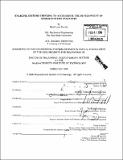Enabling systems thinking to accelerate the development of senior systems engineers
Author(s)
Davidz, Heidi L
DownloadFull printable version (42.43Mb)
Other Contributors
Massachusetts Institute of Technology. Engineering Systems Division.
Advisor
Deborah J. Nightingale.
Terms of use
Metadata
Show full item recordAbstract
As engineering systems become more complex, the roles involved in developing and managing such systems also become more complex. Thus, there is increasing interest in educating and training engineering professionals to think more systemically. In particular, there is an increasing need to accelerate the development of senior systems engineers. As new educational degree programs in systems rapidly emerge and as companies scurry to establish systems training programs to meet this need, fundamental questions still remain about how systems thinking develops in engineers. Increased understanding of the mechanisms that develop systems thinking will enable effective and efficient development of senior systems professionals. After reviewing related literature, an exploratory and inductive study was designed to gather data on enablers, barriers, and precursors to systems thinking development in engineers. In a field study conducted primarily in the United States aerospace sector, 205 interviews were conducted in 10 host companies. Senior systems engineers were studied to better understand how they developed systems thinking, and information was collected on company procedures for developing systems engineers. Using interview and survey data, comparisons were made of two control groups and senior systems engineers. (cont.) Proven stellar systems thinkers were also interviewed. To summarize the results, even though systems thinking definitions diverge, there is consensus on primary mechanisms that enable or obstruct systems thinking development in engineers. In order to reconcile the divergent definitions observed, a systems thinking framework, definition, and accompanying conceptual illustration are given. The data show that the primary mechanisms that enable systems thinking development include experiential learning, specific individual characteristics, and a supporting environment. This document defines the research space on this topic and suggests applications for the results. Better understanding of systems thinking development provides a foundation for educational interventions and employee development in systems thinking for engineering professionals across industry, government, and academia.
Description
Thesis (Ph. D.)--Massachusetts Institute of Technology, Engineering Systems Division, 2006. Includes bibliographical references (p. 210-213).
Date issued
2006Department
Massachusetts Institute of Technology. Engineering Systems DivisionPublisher
Massachusetts Institute of Technology
Keywords
Engineering Systems Division.